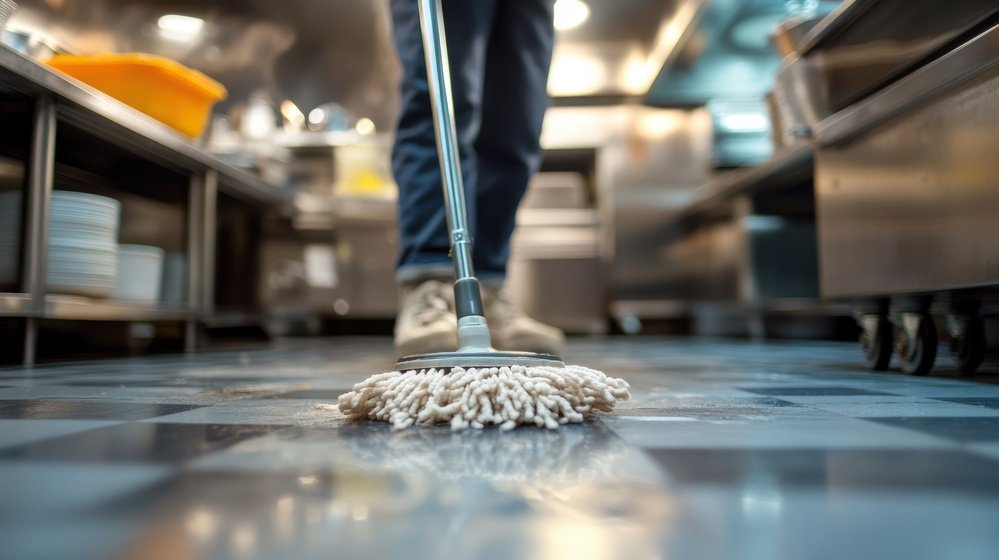Restaurant floors are dicey when it comes to cleaning. Between different materials and the punishment restaurant floors are subject to, there isn’t a black-and-white formula for getting them clean. It is not even possible to point to a single cleaning solution that works on every floor. Most professional cleaning services keep a variety of solutions in hand. They always have something for every floor they encounter.
Professionals tend to approach restaurant floors by type:
- Kitchen floors
- Dining room floors
- Vestibule and waiting area floors.
Between all three types, we could encounter several different kinds of tile along with either carpet or wood. We have seen everything from luxury tiles to budget-friendly linoleum. Every kind of floor comes with its own unique cleaning needs.
Multi-Surface Cleaners
A good starting point for restaurant floors is the multi-surface cleaner. The general rule for such cleaners is that they are appropriate for a variety of surfaces exhibiting average cleaning needs. Multi-surface cleaners are effective for general cleaning and maintenance. Are they right for your floors?
A multi-surface cleaner is probably adequate for a vestibule or waiting area. Floors in these areas are subject mostly to dirt tracked in from outside. They don’t tend to accumulate grease and kitchen dirt.
On the other hand, a cleaning crew might need something stronger for the kitchen. A multi-surface cleaner likely won’t have the decreasing power necessary to get kitchen floors truly clean. Floors in the dining room are up for grabs. It really depends on the amount of grease and grime they accumulate.
Cleaning Solutions and the pH Question
We have had more than one client ask us about cleaning solutions and pH levels. Because some types of floors are especially sensitive, we generally advise using a pH-neutral product. It will be safe for nearly all floor finishes – even sealed surfaces.
Incidentally, pH is a measurement of alkaline and acid. A pH-neutral product does not lean toward base or alkali. It is perfectly balanced. That is what makes pH-neutral cleaners so safe for floors.
Other Considerations
A basic understanding of multi-surface cleaners and pH-neutral products should set you up pretty well. But there are additional considerations depending on how a restaurant is set up. Here are a few things worth thinking about:
1. Cleaning Hardwood Floors
Although hardwood floors are not the norm in the restaurant industry, many older buildings feature them. Your best bet is cleaning them with a gentle formula that does not damage wood. Oil soap tends to be a good choice. We know of some cleaners who like to use laundry detergent.
2. Cleaning Luxury Vinyl and Ceramic
Luxury vinyl and ceramic tiles are more common than hardwoods. Fortunately, they are easier to clean and maintain. We recommend a cleaning solution designed specifically for the surface you are dealing with. A good cleaner will not only remove grease and dirt, but it will also help maintain shine.
3. Cleaning Laminates
A challenge with laminate floors is leaving behind a streaky residue. Unfortunately, some multi-surface cleaners do just that. You may have to experiment with several cleaners to find one that works. If you can’t find a suitable multi-surface product, there are specialty cleaning solutions designed for laminate floors.
We want to close with a quick word on degreasers. A cleaning product with degreasing capabilities is absolutely critical in the kitchen. More often than not, alkaline-based cleaners do an excellent job with grease.
Restaurant floors present a unique cleaning challenge. The hardest part is choosing the right cleaners for each floor surface. Nail that down and you will be on the right track.



